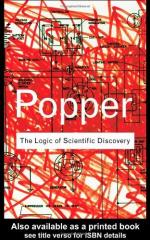|
This section contains 661 words (approx. 2 pages at 400 words per page) |

|
Part II: Chapter 4, Falsifiability Summary and Analysis
Popper's use of falsification as criteria for deciding whether or not a theoretical system is empirical, and therefore scientific, is challenged by conventionalism. Conventionalists see natural science as a logical construction of nature, not what nature is. For them, the laws of nature are simple. The construction of those laws determines the properties of the natural world. In fact, the laws are required in order to determine our observations of the world, especially scientific measurements like clocks for measuring time. Conventionalists explain inconsistencies by suggesting that greater mastery will yield more complete results, or by questioning the validity of particular measurements or instruments for measurement. Conventionalists see Popper's arguments about the underpinnings of new discoveries through deduction as a collapse of science. They see the only approach as selecting the simplest system from all possible...
(read more from the Part II: Chapter 4, Falsifiability Summary)
|
This section contains 661 words (approx. 2 pages at 400 words per page) |

|




